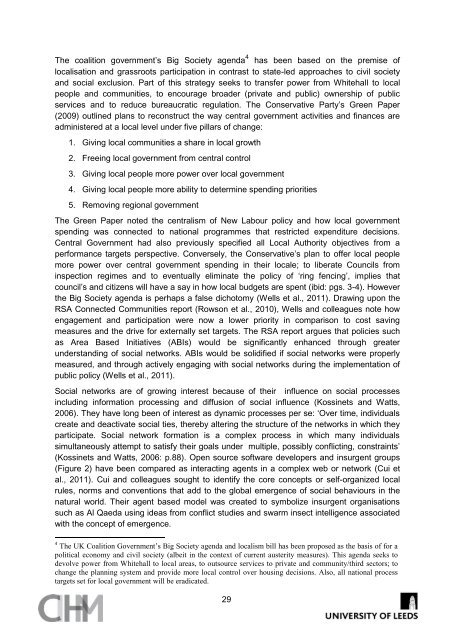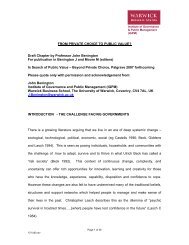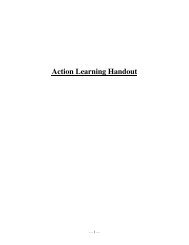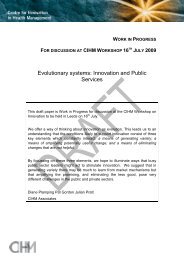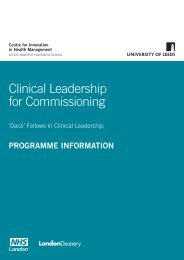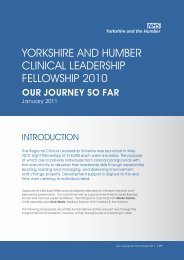Networks - a briefing paper for the Health Foundation - Centre for ...
Networks - a briefing paper for the Health Foundation - Centre for ...
Networks - a briefing paper for the Health Foundation - Centre for ...
- No tags were found...
Create successful ePaper yourself
Turn your PDF publications into a flip-book with our unique Google optimized e-Paper software.
The coalition government’s Big Society agenda 4 has been based on <strong>the</strong> premise oflocalisation and grassroots participation in contrast to state-led approaches to civil societyand social exclusion. Part of this strategy seeks to transfer power from Whitehall to localpeople and communities, to encourage broader (private and public) ownership of publicservices and to reduce bureaucratic regulation. The Conservative Party’s Green Paper(2009) outlined plans to reconstruct <strong>the</strong> way central government activities and finances areadministered at a local level under five pillars of change:1. Giving local communities a share in local growth2. Freeing local government from central control3. Giving local people more power over local government4. Giving local people more ability to determine spending priorities5. Removing regional governmentThe Green Paper noted <strong>the</strong> centralism of New Labour policy and how local governmentspending was connected to national programmes that restricted expenditure decisions.Central Government had also previously specified all Local Authority objectives from aper<strong>for</strong>mance targets perspective. Conversely, <strong>the</strong> Conservative’s plan to offer local peoplemore power over central government spending in <strong>the</strong>ir locale; to liberate Councils frominspection regimes and to eventually eliminate <strong>the</strong> policy of ‘ring fencing’, implies thatcouncil’s and citizens will have a say in how local budgets are spent (ibid: pgs. 3-4). However<strong>the</strong> Big Society agenda is perhaps a false dichotomy (Wells et al., 2011). Drawing upon <strong>the</strong>RSA Connected Communities report (Rowson et al., 2010), Wells and colleagues note howengagement and participation were now a lower priority in comparison to cost savingmeasures and <strong>the</strong> drive <strong>for</strong> externally set targets. The RSA report argues that policies suchas Area Based Initiatives (ABIs) would be significantly enhanced through greaterunderstanding of social networks. ABIs would be solidified if social networks were properlymeasured, and through actively engaging with social networks during <strong>the</strong> implementation ofpublic policy (Wells et al., 2011).Social networks are of growing interest because of <strong>the</strong>ir influence on social processesincluding in<strong>for</strong>mation processing and diffusion of social influence (Kossinets and Watts,2006). They have long been of interest as dynamic processes per se: ‘Over time, individualscreate and deactivate social ties, <strong>the</strong>reby altering <strong>the</strong> structure of <strong>the</strong> networks in which <strong>the</strong>yparticipate. Social network <strong>for</strong>mation is a complex process in which many individualssimultaneously attempt to satisfy <strong>the</strong>ir goals under multiple, possibly conflicting, constraints’(Kossinets and Watts, 2006: p.88). Open source software developers and insurgent groups(Figure 2) have been compared as interacting agents in a complex web or network (Cui etal., 2011). Cui and colleagues sought to identify <strong>the</strong> core concepts or self-organized localrules, norms and conventions that add to <strong>the</strong> global emergence of social behaviours in <strong>the</strong>natural world. Their agent based model was created to symbolize insurgent organisationssuch as Al Qaeda using ideas from conflict studies and swarm insect intelligence associatedwith <strong>the</strong> concept of emergence.4 The UK Coalition Government’s Big Society agenda and localism bill has been proposed as <strong>the</strong> basis of <strong>for</strong> apolitical economy and civil society (albeit in <strong>the</strong> context of current austerity measures). This agenda seeks todevolve power from Whitehall to local areas, to outsource services to private and community/third sectors; tochange <strong>the</strong> planning system and provide more local control over housing decisions. Also, all national processtargets set <strong>for</strong> local government will be eradicated.29


